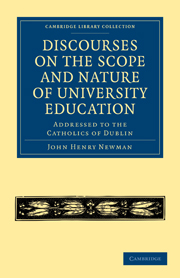Book contents
- Frontmatter
- PREFACE
- Contents
- CORRIGENDA
- Discourse I Introduction
- Discourse II Theology a Branch of Knowledge
- Discourse III Bearing of Theology on other Branches of Knowledge
- Discourse IV Bearing of other Branches of Knowledge on Theology
- Discourse V General Knowledge viewed as One Philosophy
- Discourse VI Philosophical Knowledge its own end
- Discourse VII Philosophical Knowledge viewed in relation to Mental Acquirements
- Discourse VIII Philosophical Knowledge viewed in relation to Professional
- Discourse IX Philosophical Knowledge viewed in relation to Religion
- Discourse X Duties of the Church towards Philosophy
- Appendix
- Frontmatter
- PREFACE
- Contents
- CORRIGENDA
- Discourse I Introduction
- Discourse II Theology a Branch of Knowledge
- Discourse III Bearing of Theology on other Branches of Knowledge
- Discourse IV Bearing of other Branches of Knowledge on Theology
- Discourse V General Knowledge viewed as One Philosophy
- Discourse VI Philosophical Knowledge its own end
- Discourse VII Philosophical Knowledge viewed in relation to Mental Acquirements
- Discourse VIII Philosophical Knowledge viewed in relation to Professional
- Discourse IX Philosophical Knowledge viewed in relation to Religion
- Discourse X Duties of the Church towards Philosophy
- Appendix
Summary
I am very sensible of the meagreness of the following illustrations of the main principles laid down in the foregoing Discourses; but, as I am so situated that I cannot give the time or labour necessary for satisfying my own sense of what they ought to be, I avail myself of such as happen to be at hand or on my memory.
Knowledge is the direct end of University Education.
I hardly know what steps to take in order to establish this position, which has been startling to some persons, viz., that the education of the intellect, or the diffusion of knowledge, is the direct scope of a University. It seems a truth, or rather an historical fact, which it is impossible to dispute, and therefore hardly possible to prove. What would be the popular description of a University? A place for learned and scientific men, a learned body, a large corporation, with professors of art and science, with faculties in theology, law, and medicine, with logical disputations, with examinations in intellectual proficiency, with degrees in token of that proficiency attained. I do not say that, over and above this account of it, the notions will never suggest themselves of Religious Festivals, Solemnities, and Sermons, of discipline, of Proctors, of ecclesiastical jurisdiction, delegates to Councils, etc.; but the question before us is as to the idea on the whole, or the formal conception, of a University in the minds of the generality of men; and I cannot doubt it would be pronounced at once to be a seat of science and letters, or that its end is knowledge.
- Type
- Chapter
- Information
- Discourses on the Scope and Nature of University EducationAddressed to the Catholics of Dublin, pp. 369 - 449Publisher: Cambridge University PressPrint publication year: 2010First published in: 1852

